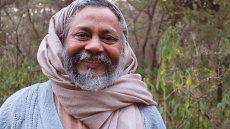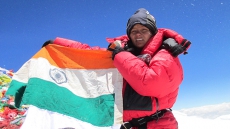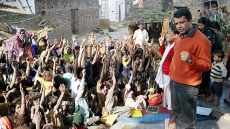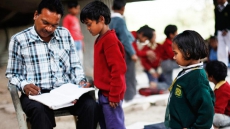At the age of 17, when Ajeet Singh adopted three children of a sex worker, he laid the foundation of a revolutionary movement that has rescued and rehabilitated more than a thousand lives from prostitution and trafficking.
In northern India’s holy city of Varanasi, which is also the constituency of India’s Prime Minister, Narendra Modi, Ajeet Singh and his team operate a non-profit organization, Guria, meaning ‘doll’ in Hindi. For nearly three decades, Guria has been waging a war against trafficking by rescuing minors and second generation prostitutes from trafficking, rehabilitating them and fighting cases against pimps and brokers so they do not integrate back into society as repeat offenders.
At the time Singh decided to tackle trafficking in Varanasi, there was hardly any name associated with reformation in this sector. But at the age of 17, when he attended a marriage in Uttar Pradesh, India, he was distraught to witness a sex worker dance all night to lewd comments and spontaneously proposed adopting her three children to save them from exposure of this market. He did manage to adopt them after two years, but faced social ostracism for integrating children of those deemed pariahs into mainstream society. Singh defines that time as the most difficult in his life describing it worse “than the bullets and attacks I face these days.”
In India, prostitution is a USD $8.4 billion market targeting three million individuals*. Stakeholders in the prostitution industry consist of pimps, brothel keepers, police, policy makers, customers, and social workers, with the latter tackling high-risk operations of rescue against closely woven others. “Rescuing and rehabilitating victims of prostitution and sexual exploitation needs a lot of risk, determination and patience,” describes Singh and he is right; cross-border and inter-state border missions are high-risk intricate procedures executed uniformly with cooperative agencies.
At Guria, the process is divided into three steps – pre-rescue, rescue and post-rescue. Pre-rescue involves identification of place of rescue, victim identity verification, attaining legal warrants, recce entry/exit and escape points, formation of rescue team, and allocation of a shelter home. The next step, rescue, involves execution of pre-rescue plans including conducting rescue operation in cooperation with authorities, collecting evidence, and identifying children and belongings to avoid blackmailing from offenders. Post-rescue operation accounts rehabilitation and preventive measures – filing a police complaint, shifting victims in shelter homes or with family, mock trials with victim, witness protection, submission of charge sheet after investigation, and opposing bail of traffickers. Guria’s legal team comprising senior advocates from district courts, High Courts and Supreme Court assist Singh and his team with legal proceedings to ensure support to the victim and maximum sentencing of offenders.

Guria maintains rescue of minors and second generation prostitutes as their prime focus. Within the red light areas of Varanasi and Mau, another center of operation for Guria, the organization has installed non-formal education and vocational training centers that bridge a smooth transition for survivors into mainstream culture. “Social reintegration is the ultimate aim of all rehabilitation programs. This reintegration is with the family and with the society. Many girls also opt for marriage as a further development,” points Singh.
For Singh, education is important but what’s also necessary is the curiosity to explore the distinction between knowledge and wisdom. “The whole idea is to innovatively take a child into the world of inward journey/introspection through the tool of Art – painting, music, dance, theatre, photography, videography, shouting class, laughing class, meditation, gardening, feeding the birds…and by default connect them to the entire existence around us at the subconscious level, to visualize the extension of the self in the birds, trees, rivers, mountains, animals, humans, religions, races, nations.”
As Singh reflects upon the journey, the ups and downs, challenges and struggles, he cements assurance for those skeptical of social change. “28 years back in 1988 I had not heard of any one working focussed specially against sex trafficking. Today people, civil society organisations and governments are talking about the issue – this is a major victory. I strongly feel talking about a problem is basically the beginning of a solution.”
* Stats taken from Havocscope
Photo Credit: Ajeet Singh, Guria






